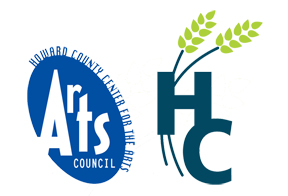Eamon Grennan’s voice from the stage was low, intimate and slightly scratchy, as if he were whispering his poems into your ear. It was a lovely effect, one which the audience quickly took a shine to, but induced by Grennan’s terrible respiratory affliction.

Eamon Grennan at the book signing table. Photo by Lee Waxman.
Sick as a dog, Grennan traveled to Columbia anyway, and read at HoCoPoLitSo’s 38th Annual Irish Evening of Music and Poetry last Friday. He knew, as a small organization with little fat in our budget, that HoCoPoLitSo would be floored if he didn’t read. So he coughed backstage, and before and after taping his appearance on The Writing Life (HoCoPoLitSo’s literary talk show), popped cough drops, mopped his nose and soldiered on.
HoCoPoLitSo, and its audience Feb. 19, was grateful, for his reading, his gentle humor and his poems about his native country and ours, the one he adopted fifty years ago. He still migrates every year between Poughkeepsie, where he taught for forty years at Vassar, and the west of Ireland.
Her Excellency Anne Anderson, the Irish ambassador, introduced Grennan as “deeply rooted in Ireland, yet totally versed in the international tradition.” Grennan, she said from the stage, “finds the extraordinary in the ordinary, and sacredness in the small moment.”
Judges agree. Poet Robert Wrigley noted, on awarding Grennan the Lenore Marshall Poetry Prize, that “Grennan would have us know—no, would have us see, feel, hear, taste and smell—that the world, moment by ordinary or agonizing moment, lies chock-full with its own clarifications and rewards.”
Grennan has a special way with poems about the natural world; several in the audience commented afterwards how much they loved “Listen,” a ruminative poem about cow conversation. Friday night’s audience laughed and clapped for his preamble to his disquieting poem, “Rats,”: “I’m usually kind to animals,” he said, with a wry smile.

Eamon Grennan. Photo by Lee Waxman.
At the last heartfelt line, “Come back and wish on us,” from his poem “Ladybird and Mother,” the audience burst into spontaneous applause. His superstitious mother, he said fondly, always wished on the tiny red and yellow spotted beetles that the Irish call “ladybirds,” and we call “ladybugs.”
Many in the audience nodded sadly when hearing his elegy to the late, great Irish poet Seamus Heaney (Nobel winner and HoCoPoLitSo guest three times). The poem “Sudden Dark” describes how Seamus himself would have found the sharp shards of light in the dark of mourning.
“Pulling light out of dark,” Grennan explained, “poetry is about recognizing both sides constantly.”
Grennan even read from William Butler Yeats’ controversial and beautiful poem, “Easter, 1916,” about the Easter uprising 100 years ago this April, and called it “the most responsible political poem in English.”
And he stayed late, signing every last seeker’s book, especially his latest, There Now, and chatting with Irish, American and English alike in the lobby. Finally, about 10:15 p.m., he gave up the ghost, and asked for a ride to his hotel. Unflaggingly grateful and polite, he chatted in the car about the crowd, migrating back and forth to Dublin, and his daughter’s career as a visual artist before he and his cough disappeared into the lobby.
Susan Thornton Hobby
Recording secretary
Bonus: Below you can enjoy the episode of HoCoPoLitSo’s The Writing Life that Mr. Grennan recorded in 1995 when he last visited Howard County. In the video, he is in conversation with Terence Winch.





[…] Eamon Grennan came to read for Irish Evening this year, he fought a terrible cold and probably exhaustion from traveling to not disappoint his fans. And […]